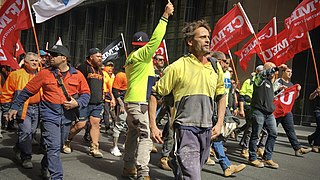Labour laws, labour code or employment laws are those that mediate the relationship between workers, employing entities, trade unions, and the government. Collective labour law relates to the tripartite relationship between employee, employer, and union.

Strike action, also called labor strike, labour strike in British English, or simply strike, is a work stoppage caused by the mass refusal of employees to work. A strike usually takes place in response to employee grievances. Strikes became common during the Industrial Revolution, when mass labor became important in factories and mines. As striking became a more common practice, governments were often pushed to act. When government intervention occurred, it was rarely neutral or amicable. Early strikes were often deemed unlawful conspiracies or anti-competitive cartel action and many were subject to massive legal repression by state police, federal military power, and federal courts. Many Western nations legalized striking under certain conditions in the late 19th and early 20th centuries.

A part-time job is a form of employment that carries fewer hours per week than a full-time job. Workers are commonly considered to be part-time if they work fewer than 30 hours per week. Their hours of work may be organised in shifts. The shifts are often rotational.
The National Trades Union Congress (NTUC) spearheads the labour movement of Singapore, which represents almost a million workers in the country across more than 70 unions, affiliated associations and related organisations. Singapore runs on a tripartism model which aims to offers competitive advantages for the country by promoting economic competitiveness, harmonious government-labour-management relations and the overall progress of the nation.
A number of labour strikes, labour disputes, and other industrial actions occurred in 2017.
A number of labour strikes, labour disputes, and other industrial actions occurred in 1991.
In 1987, a number of labour strikes, labour disputes, and other industrial actions occurred.

